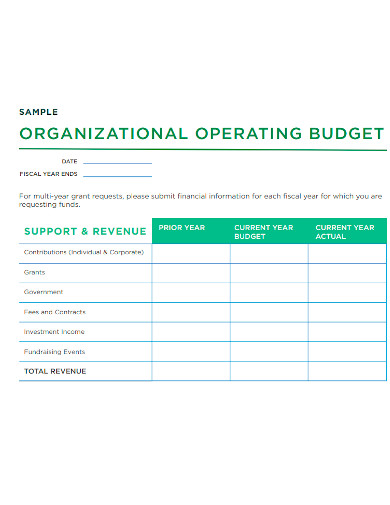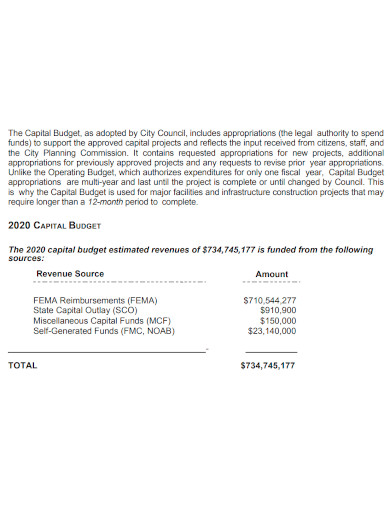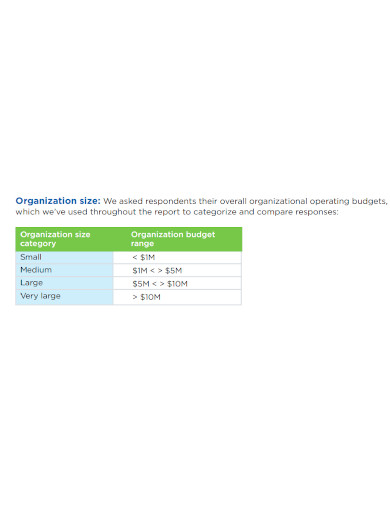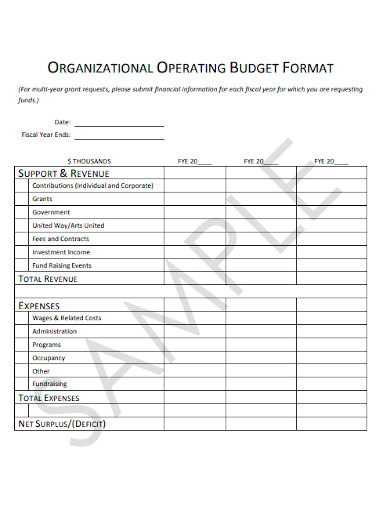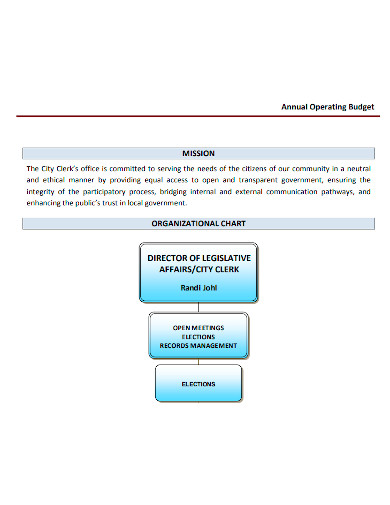When operating an organization or a company, one of the things that need to be taken care of and prioritized is creating and approving budgets for various departments and processes that an organization has. One of the important budgets that need to be done and approved quickly is an operational budget. An operational budget is a financial document that presents all the funds needed to keep your organization running efficiently. Other organizations use their operating budgets to determine how much money they need from their sales revenue, interest income, and investment sources to pay their different expenses and costs to do their operations. You also need this type of budget to determine the budget you need to keep up with your operations. This article will guide you on how to make an organizational operating budget.
4+ Organizational Operating Budget Samples
1. Organizational Operating Budget Sample
2. Annual Organizational Operating Budget
3. Printable Organizational Operating Budget
4. Standard Organizational Operating Budget
5. Organizational Operating Budget Format
What Details to Include in an Operating Budget?
1. Income Statements
Show all your income through an income statement. Specifically, give specific details of the revenue (such as the breakdown of the revenue total into the specific sales figure generated) you’ve earned from the sales of the goods and services you’re selling. Breaking down the revenue will help you see which products or services produce more sales.
2. Production Expenses
One of the major expenses a business has is associated with production costs. This type of cost includes the raw materials needed to produce the product they’re selling, the manufacturing process costs, and the cost of the payroll of employees’ working on the production. For a service-based business, production costs involved the tools and equipment they use to do the service and the cost of the employees doing the services as well.
3. Operational Expenses
Operational expenses are the costs of conducting business daily. Examples of operating expenses include rent, utility bills, taxes, and license fees. Payroll for non-production personnel, such as human resources, accounting, and administrative staffers, also fall under the heading of operational expenses.
4. Revenue
The revenue is the money you’ve earned from your sales and other sources where you can earn money. If the revenue exceeds the expenses in your operational budget, then you’ve earned a profit. What you do with your profit is up to you. You can distribute the profit to your business partners or use it for other investment ventures. However, if your expenses exceed your revenue, then you suffer a loss.
How to Make an Organizational Operating Budget?
1. Make Your Budget Based on Your Income
The first thing you need to do is to decide on how to base your budget through your income projection. You can do this by basing the projection of your income and expenses on the previous year’s budget. Don’t forget to separate reliable revenue and sales income from your income sources as each does a different role in a properly planned operating budget.
2. Determine Your Recurring Expenses
Just like any other business, your budget will mostly consist of your recurring expenses, also known as fixed costs. Your fixed costs can be direct or indirect. The direct costs are related to providing costs and services to your clients while indirect costs are the expenses relating to operating your business. When calculating your budget, ensure that your recurring expenses are covered by your reliable income sources.
3. Project Funding from Grants and Donations
Sometimes, your organization will have a one-time type of expense and these may be due to special events or projects. Since this type of expense can cost more than your usual budget, you can obtain a budget to afford this expense through transitory income. This type of income is generated from sources such as grants or one-time donations. You can also use your surplus income to also fund these types of events.
4. Other Considerations
When making your operating budget, remember not to include your capital expenses since this type of expense does not necessarily affect your operations. Capital expenses need an entirely separate budget since there are many parts of that budget that need to be addressed. Make sure you let the executives and the board of directors review your budget before you finalize it.
FAQs
What are the four elements of operational budget?
The four elements are income, fixed expenses, flexible expenses, and unplanned expenses and savings.
What are the types of budget?
The different types of budget are master budget, operating budget, cash budget, financial budget, labor budget, and static budget.
How often should an operating budget be monitored?
The operating budget should be monitored regularly throughout the year whether it is done quarterly, monthly, or even weekly. This will help you identify problems within your operations before they cost your company or organization too much time or money to deal with it.
Calculating the operating budget is important not only because it provides your organization a roadmap for efficient financial management that will help your finances in the long run but the budget is also useful whenever you need documentation for grant applications or if tax collection agencies will review your budget. To help you get started making the contract, download our free sample templates above to use as your guide!
Related Posts
FREE 10+ Expense Budget Samples in MS Word | Google Docs | Google Sheets | MS Excel | PDF
FREE 4+ Vacation Budget Planner Samples in PDF
FREE 10+ Budget Outline Samples in PDF | MS Word
FREE 10+ Conference Budget Samples in MS Word | MS Excel | Google Docs | Google Sheets | Apple Pages | PDF
FREE 10+ Monthly Budget Worksheet Samples in PDF | MS Word | Google Docs | Google Sheets | Excel
FREE 10+ Monthly Project Budget Samples in MS Word | MS Excel | Google Docs | Google Sheets | PDF
FREE 10+ Corporate Budget Samples in MS Word | MS Excel | Google Docs | Google Sheets | PDF
FREE 9+ Primary School Budget Samples in MS Word | Google Docs | Google Sheets | MS Excel | PDF
FREE 10+ Operational Budget Samples in PDF | DOC
FREE 5+ Budget Layout Samples in PDF
FREE 6+ Paycheck Budget Samples in PDF | MS Word
FREE 10+ Architecture Budget Samples in PDF
FREE 10+ Capital Budget Samples in PDF | MS Word | Google Docs | Google Sheets | Excel | Apple Numbers | Apple Pages
FREE 10+ Budget Tracker Samples in PDF | DOC
FREE 4+ Corporate Monthly Budget Samples in MS Word | Google Docs | Google Sheets | Excel

